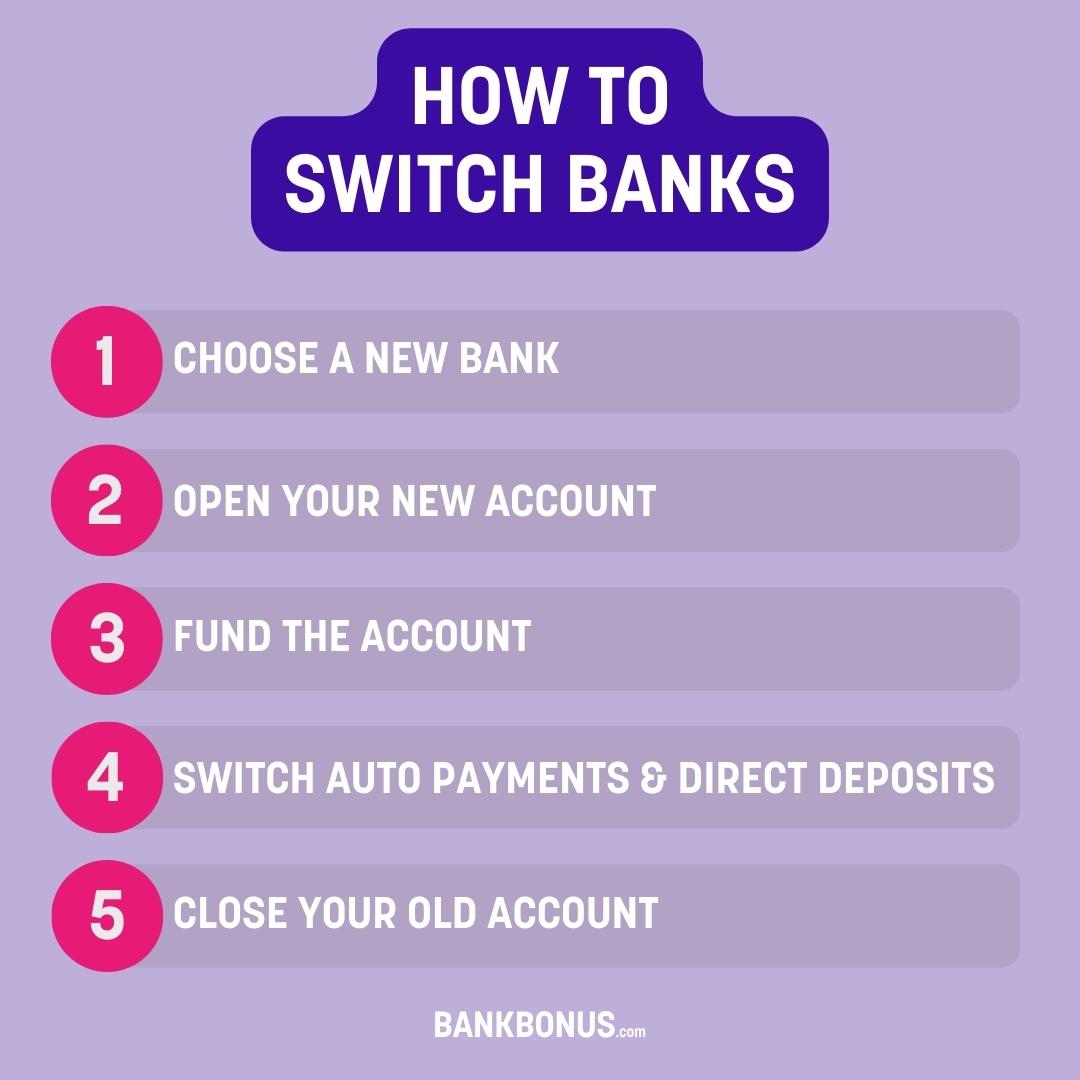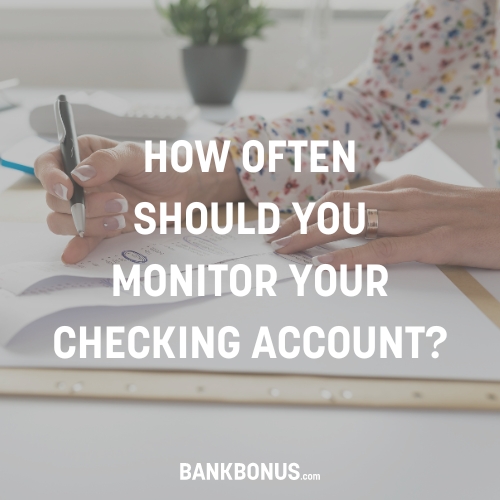Sometimes, it makes sense to switch to a bank that aligns better with your financial goals and life situation. The same account you signed up for in college might not meet your needs today.
I used to bank with Citibank but moved most of my accounts to Chase for its private client program. I also switched because there’s a branch two blocks from my house, and I can easily go into any Chase branch in the country when I travel.
Switching accounts was an easy process—I moved my money with a simple wire transfer, changed my direct deposit, and got a bank bonus in the process. It took almost less than an hour to switch.
In this step-by-step guide, I’ll show you how to switch banks and walk through a few reasons you may want to consider a new bank.
Steps to Switching to a New Bank
- Step 1. Choose a New Bank
- Step 2. Open Your New Account
- Step 3. Fund the Account
- Step 4. Switch Automated Payments and Direct Deposits
- Step 5. Close Your Old Account
1. Choose a New Bank
If you’re considering a bank switch, the first step is choosing a new bank. It’s important to identify your needs and preferences, and then find a bank that matches them.
Here are some of the biggest factors to consider:
- Mobile app
- Competitive interest rates
- Product Variety
- Account features
- Overdraft coverage
- Customer service
- Bank bonuses
- Fees
- Branch/ATM network
When you choose an account, be sure to read the fine print before applying to understand the fees, rates, and other important account terms.
2. Open Your New Account
Once you find the right bank for your needs, it’s time to open your account. Many banks allow you to sign up online for a new deposit account, which should be a relatively quick process.
You’ll likely need to provide your name, date of birth, driver’s license number, Social Security Number, address, and contact information, as well as answer a few questions about your employment.
From there, you’ll be prompted to set up mobile banking, find instructions on receiving your debit card, and be able to fund your new account.
3. Fund the Account
Once your account is approved, you need to deposit money into it. A lot of banks set a minimum deposit amount, while others don’t have any requirements. You may be able to get a welcome bonus at some banks if you meet minimum deposit requirements.
Regardless, it’s important to fund your new account so you can start using it. When I opened my Chase account, I made a quick wire transfer to fund it.
Depending on your bank, you may have several options for funding a new bank account, including:
- Transferring funds from an existing account
- Depositing cash/check at a branch
- Setting up direct deposit with your employer
Once you fund the account, you can start using it to make purchases, pay bills, and set up automated payments.
4. Switch Automated Payments and Direct Deposits
It’s crucial to take inventory of any ongoing payments or direct deposits linked to your old account. If any of the following payments are connected to your account, be sure to link them to your new account:
- Automatic bill payments (loans, credit cards, etc)
- Paychecks
- Recurring transfers to investment or savings accounts
- Alimony or child support
- Government benefits
- Ongoing subscriptions (gym memberships, streaming services, etc)
Once you’ve reviewed your bank statements and identified these transactions, you can easily set up direct deposits, recurring payments, and automatic payments that you want to be linked to the new account.
You’ll also need to update your mobile wallet and any online accounts with your new billing information.
5. Close Your Old Account
Make sure to leave some money in your old account for a while. This could help you meet minimum balance requirements and avoid a monthly maintenance fee. It also leaves time for checks to clear and any automatic payments or deposits to transfer.
Once you feel confident that you’ve made all the necessary transfers and covered account minimums for the month, you can close your account. Some accounts can be closed online or over the phone, while other banks may require you to cancel your account in person.
There may also be a fee for closing your account. Be sure to ask for documentation of your account closure and shred your debit card and any remaining paper checks tied to your account.

Reasons To Switch Banks
In a 2023 banking study from Caliber, 37% of Americans said they’re likely to switch banks in the next 12 months, up 3% from the previous year’s survey.
Here are some of the most common reasons people switch banks:
1. Fees
While some banks offer free checking accounts, others charge a lot of fees. But that doesn’t mean you have to be their customer. Online banks tend to charge fewer fees for their banking services than brick-and-mortar banks.
If you tend to overdraft your account, look for a bank that doesn’t charge overdraft fees or one that offers overdraft protection.
And if you have difficulty maintaining a minimum balance requirement, opt for a bank that doesn’t require one. You can also avoid fees with many banks by adding direct deposits and using in-network ATMs.
2. Online Banking Access
Most banks offer mobile banking, with features like online bill pay and mobile check deposits. If your current bank doesn’t, it might be time to look for a new account.
Mobile banking becomes all the more essential if you’re frequently on the go. Automatic transactions and bill payments can be executed quickly, even when you only have a few minutes to spare.
If you can’t remember the last time you set foot in your bank’s physical location, you may want to consider an online-only bank. Online banks generally have lower overhead, which usually translates to lower fees and higher Annual Percentage Yields (APYs) on your deposits.
3. Customer Service
If you’re unhappy with the level of service you’re getting with your current bank, look for new options. Big national banks provide in-person support at brick-and-mortar locations. Phone support and online chat are also common.
And keep in mind that some banks operate to make their platforms so user-friendly that you won’t need help very often, while others employ 24/7 call centers.
If you prefer to have all of your accounts at one financial institution, you may also consider relationship banking. Larger banks often offer a variety of financial products, such as savings accounts, checking accounts, investment accounts, personal finance advice, and mortgages — essentially serving as a one-stop shop.
4. Life Changes
As your life changes, so do your banking needs. For example, you may have to leave your local bank behind if you move for work. Or, if you’ve recently been married, you might need a bank with a joint account.
If you move frequently or travel a lot, it might make sense to switch to a national bank with locations across the country or internationally. On the other hand, if you don’t travel much, a local credit union could be a better fit.
If you’re earning more money now than you used to, you may qualify for premium bank accounts that are tailored to higher-income individuals. Whichever bank you go with, make sure it’s a Member FDIC so your deposits are protected.
5. Better Perks
Banks compete with one another to attract new customers with attractive perks. There’s no harm in switching to a new bank to get in on the action. For example, many banks offer sign-up bonuses to new customers.
Other banks offer rewards-earning debit cards and credit cards, interest-bearing accounts, and access to exclusive offers and experiences. Taking advantage of these offers puts your money to work for you.
If you’ve saved enough money to meet a higher opening deposit requirement, you might want to consider a premium or private checking account. These accounts often come with free safe deposit boxes, higher interest rates on your deposits, and access to investment services.
Frequently Asked Questions
Is it bad to switch banks?
It isn’t bad to switch banks, as long as you don’t leave any pending payments or bills hanging in your old bank account that could wind up on your ChexSystems report.
When you decide to make a move, don’t be surprised if your current bank tries to keep you on board. Don’t feel guilty or let your emotions factor into the equation.
Does switching banks affect my credit?
No. Switching to a new bank will not affect your credit score because you aren’t requesting credit from a lender. When opening a new bank account, your new bank may run a soft credit inquiry, which won’t impact your score.
However, if you leave an open balance on your old bank’s credit card; it could get sent to collections and hurt your score. Stay on top of your bank account numbers and bill payments, and close your old account once the switch is complete.
Should I close my bank account before switching banks?
As we mentioned above, it’s important to keep your old bank account open until all of your checks and automated payments have cleared and you’ve met any minimum account requirements.
If you close your account before switching all of your recurring payments or automated payments over, you could incur fees for bounced checks or attempted charges.
Is there a downside to switching bank accounts?
Switching bank accounts can have potential downsides. First, it takes time and effort to update all your automatic payments and direct deposits. Additionally, some banks may charge fees for closing an account or transferring funds.
Switching banks might also mean losing access to benefits provided by your current bank. That’s why it’s important to compare account features and fees before making the switch to ensure you choose the best bank for your needs.
Bottom Line
There are a lot of valid reasons for switching over to a new bank. Whether you’ve experienced a financial life change or you’re simply looking for better interest rates, there’s a bank out there to meet your needs.
If you’re still on the fence, remember that there’s no reason why you can’t switch banks more than once. It’s not uncommon to have several bank accounts, which is completely fine as long as you keep your payments and account information organized.





Comments are closed.
Comments are closed here.